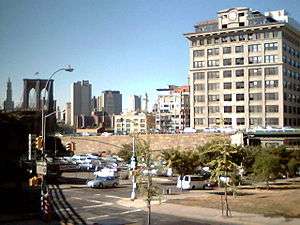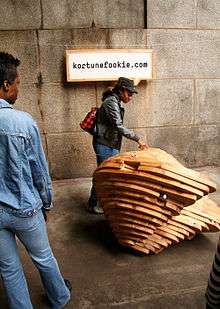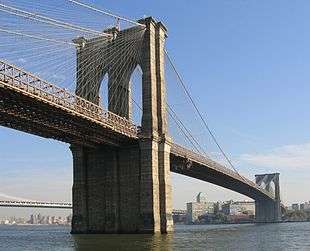Dumbo, Brooklyn
| DUMBO DUMBO, Down Under the Manhattan Bridge Overpass | |
|---|---|
| Neighborhood of Brooklyn | |
|
View of Dumbo, with the Brooklyn Bridge and the island of Manhattan in the background | |
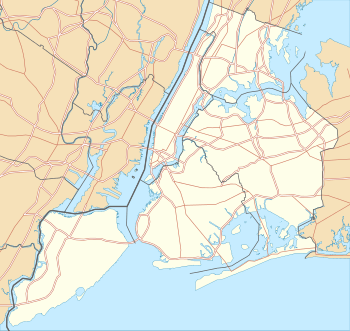 DUMBO  DUMBO  DUMBO Location | |
| Coordinates: 40°42′11″N 73°59′22″W / 40.70306°N 73.98944°WCoordinates: 40°42′11″N 73°59′22″W / 40.70306°N 73.98944°W | |
| Country |
|
| State |
|
| City |
|
| Borough | Brooklyn |
| Area | |
| • Total | 0.050 sq mi (0.13 km2) |
| Population (2010) | |
| • Total | 1,139 |
| • Density | 23,000/sq mi (8,800/km2) |
| ZIP Codes | 11201 |
| Median household income | $171,842[1] |
|
DUMBO Industrial District | |
|
Plymouth Street, DUMBO Industrial District, March 2008 | |
   | |
| Location | Roughly bounded by Main and Washington Sts, East River, John St., Bridge and Jay Sts., and Front and York Sts., Brooklyn, New York |
| Coordinates | 40°42′11″N 73°59′17″W / 40.70306°N 73.98806°W |
| Area | 48 acres (19 ha) |
| Built | 1883 |
| Architect | multiple |
| Architectural style | Greek Revival, Italianate, et al. |
| NRHP Reference # | 00001151[2] |
| Added to NRHP | September 22, 2000 |
Dumbo (or DUMBO,[3][4] short for Down Under the Manhattan Bridge Overpass) is a neighborhood in the New York City borough of Brooklyn. It encompasses two sections: one located between the Manhattan and Brooklyn Bridges, which connect Brooklyn to Manhattan across the East River, and another that continues east from the Manhattan Bridge to the Vinegar Hill area. The neighborhood is bounded by Brooklyn Bridge Park to the north, the Brooklyn Bridge to the west, Brooklyn Heights to the south and Vinegar Hill to the east. Dumbo is part of Brooklyn Community Board 2.
The area was originally a ferry landing, characterized by 19th and early 20th century industrial and warehouse buildings, Belgian block streets, and its location on the East River by the imposing anchorage of the Manhattan Bridge. The entirety of Dumbo was bought by developer David Walentas and his company Two Trees Management in the late 20th century and remade into an upscale residential and commercial community first becoming a haven for artist galleries and presently a center for technology startups. The large community of tech startups earned DUMBO the moniker as "the center of the Brooklyn Tech Triangle". In that time, Dumbo has become Brooklyn's most expensive neighborhood, as well as New York City's fourth richest community overall, due in part to the large concentration of technology startups, its close proximity to Manhattan and the prevalence of converted industrial buildings into spacious luxury residential lofts.[5]
The neighborhood currently serves as the corporate headquarters for e-commerce retailer Etsy[6] and home furnishing stores company West Elm.[7]
Name
The name is an acronym for Down Under the Manhattan Bridge Overpass. Several other New York City neighborhoods are known by portmanteaus, including Tribeca, SoHo, NoHo, NoMad, and Nolita in Manhattan, and BoCoCa in Brooklyn.[3][4]
History
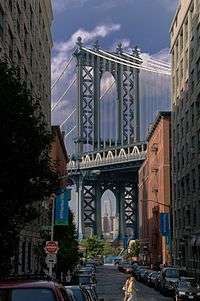
In the 1890s, the western portion of the neighborhood was known as Fulton Landing, after the ferry stop that connected it to Manhattan before the Brooklyn Bridge opened. At that time, it was primarily a manufacturing district, with warehouses and factories that made machinery, paper boxes and Brillo soap pads. The area has been known, variously, as Rapailie, Olympia, and Walentasville.[8] The cardboard box was invented in the Robert Gair building on Washington Street by Robert Gair, a Scottish emigrant; because of Gair's fame, the area was known as Gairsville for a long time.[8] The Gair building is now home to Etsy.[9]
With deindustrialization it began becoming primarily residential, when artists and other young homesteaders seeking relatively large and inexpensive loft apartment spaces for studios and homes began moving there in the late 1970s.[4] The acronym Dumbo arose in 1978, when new residents coined it in the belief such an unattractive name would help deter developers.[4]
Near the end of the 20th century, as property became more and more expensive in Manhattan, Dumbo became increasingly gentrified. Still, by 1997, the acronym Dumbo was largely unknown, and the area itself was very inclusive, serving mainly as an enclave for artists located along the East River and under the Manhattan Bridge. There were still many air conditioner repair shops, auto shops, and "seedy back alleys and wharves"; however, as the neighborhood was still gentrifying from an industrial district, it lacked even a bookstore, coffee shop, or laundromat at the time.[10]
The efforts of Joy Glidden, the Founding Director of the Dumbo Arts Center (DAC) and co-founder of the Dumbo Art Under the Bridge Festival, achieved successful development in Dumbo, which is now a model for similar waterfront developments around the world.[11] Glidden stated of Dumbo's gentrification, "It may be one of the last of what could be considered a true arts community in New York."[10]
The DUMBO Historic District, a historic industrial complex and national historic district in Dumbo, was listed on the National Register of Historic Places in 2000.[2] It consists of 95 contributing buildings, and the manufacturing concerns located in this district included Arbuckle Brothers (coffee and sugar), J.W. Masury & Son (paint), Robert Gair (paper boxes), E.W. Bliss (machinery), and Brillo (soap pads). The district includes the earliest, large scale reinforced concrete factory buildings in America.[12]
On December 18, 2007, the New York City Landmarks Preservation Commission voted unanimously to designate Dumbo as the city's 90th historic district. The Dumbo historic district consists of properties bound by John Street to the north, York Street to the south, Main Street to the west, and Bridge Street to the east.[13]
Land use
Art, business, and leisure
The area has emerged as one of New York City's premier arts districts, with a cluster of for-profit art galleries such as the Klompching Gallery and such not-for-profit institutions as the St. Ann's Warehouse and the A.I.R. Gallery.
Chef Jacques Torres opened a chocolate factory in Dumbo in December 2000.[14] Other culinary businesses in the area include Grimaldi's,[15] the Brooklyn Ice Cream Factory,[16] and The River Café,[17] all clustered in Fulton Landing, also home to Bargemusic, a floating venue for classical music.[18]
Invitations for the 2009 presidential inauguration of U.S. President Barack Obama were printed by Dumbo printer Precise Continental.[19]
The first public space in the neighborhood was Fulton Ferry,[20] followed by Empire-Fulton Ferry State Park.[21][22] The first six acres of Brooklyn Bridge Park, a joint state/city venture presently under development, were opened in March 2010.[23]
The building at 200 Water Street, which the Brillo Manufacturing Co. once occupied, is being renovated as a high-end condo building.[24]
Tech hub
Dumbo has New York City's highest concentration of technology firms by neighborhood.[9] Dumbo is home to 25 percent of New York City-based tech firms. Within a 10-block radius are 500 tech and creative firms that employ over 10,000 people.[9]
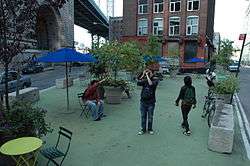
The City of New York, in conjunction with New York University, installed an incubator in Dumbo to support development of tech start-ups.[9] Dumbo's average office rent of $25 per square foot makes it more attractive to start-ups than Manhattan, where rents averaged $40 per square foot in 2013.[9]
The area has been compared to the Silicon Roundabout area in Shoreditch, East London, as well as to Manhattan's Silicon Alley.
Transportation
New York City Subway stations are located at York Street (F train) on the IND Sixth Avenue Line, and High Street (A C trains) on the IND Eighth Avenue Line.[25] New York City Bus service is provided by the B25, B67, B69.[26]
Ramps and staircases connects the Brooklyn Bridge and Manhattan Bridge walkways to Dumbo.
The East River Ferry began operations in July 2011, connecting the wharf at Fulton Landing to stations in Manhattan and Williamsburg. NY Waterway formerly ran a water ferry from the Fulton Slip at Fulton Landing. The East River route will become part of the Citywide Ferry Service[27] starting in 2017, and a new route to Bay Ridge would also stop at Dumbo.[28][29]
Housing
The neighborhood contains the Farragut Houses, a group of ten towers managed by the New York City Housing Authority.[30]
In popular culture
- Jerry Seinfeld referred to Dumbo on a late-night talk show appearance, joking that it stands for "Down Under Manhattan Bridge", but that New Yorkers added the "O" at the end because they did not want to live in a neighborhood called "Dumb".[31]
- Tracy Bonham wrote a song about her years in Dumbo on her CD Blink the Brightest, "Dumbo Sun".
- The neighborhood is parodied in Grand Theft Auto IV as BOABO ("Beneath the Off-ramp of the Algonquin Bridge Overpass").
- It is featured as a filming location in the films Killer's Kiss (1955), The French Connection (1971), and Vanilla Sky (2001). It is also featured in Big Bang's music video Blue (2012), the music video for "Cruel Summer" by Bananarama (1983) and the opening credits of Rescue Me (2004).
- It is the residence of the Humphrey family on the television series Gossip Girl. The view from Washington Street appears very often to inform the viewer of the scenario change from Manhattan to Brooklyn.
- Dumbo is the inspiration of Nacrene City in the Pokémon Black and White games.
- Dumbo is featured prominently in the Sergio Leone drama film Once Upon a Time in America as the location for one of its pivotal scenes.
- Dumbo appears on Law and Order: Special Victims Unit as a site of a runaway girl and a rave in season two.
- Dumbo is the starting location for the new First-person shooter The Division by Tom Clancy.[32][33]
- Dumbo appears on the show Orange Is the New Black in the episode "Toast Can't Never Be Bread Again," the fourth season's finale, as part of a flashback sequence of Poussey Washington's past, in which she is separated from her friends and meets some drag artists who take her to a party in a club in Dumbo.
References
- ↑ "Dumbo neighborhood in Brooklyn, New York (NY), 11201 detailed profile". City-Data.com. Urban Mapping, Inc. Retrieved September 6, 2015.
- 1 2 National Park Service (2009-03-13). "National Register Information System". National Register of Historic Places. National Park Service.
- 1 2 Dolkart, Andrew S.; et al. (December 18, 2007). DUMBO Historic District Designation Report (PDF). New York City Landmarks Preservation Commission. Retrieved September 6, 2015.
- 1 2 3 4 Barnard, Anne (December 25, 2007). "Dumbo Journal: District Trying to Forge a New Identity". The New York Times. Retrieved September 6, 2015.
- ↑ Nonko, Emily (2015-01-27). "The 8 Most Expensive Neighborhoods in New York City". New York.com. Retrieved 2015-11-07.
- ↑ [Goodman, Wendy. "See Inside Etsy’s Seriously Fun Brooklyn Office", New York (magazine), August 14, 2014. Accessed September 27, 2016. "The other day, I took a tour of Etsy's Dumbo offices and was pleased to find them as original, wacky, and one-of-a-kind as a workplace can get."
- ↑ Gurfein, Laura. "Here's the First Look at West Elm's New Dumbo Home", Racked.com, January 13, 2015. Accessed September 27, 2016.
- 1 2 "About Dumbo". Dumbo NYC, Brooklyn. DumboNYC.com. Retrieved 2012-12-10.
- 1 2 3 4 5 Graham, Jefferson. (2013, May 7). It's hip to be tech in Brooklyn's Dumbo. USA TODAY, p 5B.
- 1 2 "As It Turns Artistic, A Noirish Enclave Steps Into the Light". October 10, 1997. New York Times article by Peter Marks; accessed Nov. 12, 2010.
- ↑ Dumbo - Soul of Brooklyn. "The DUMBO Arts Center was founded by Joy Glidden and under her direction from 1997-2006 has helped to establish a successful model for waterfront development that has been referred to and used internationally". Retrieved June 12, 2014.
- ↑ Kathy Howe (June 2000). "National Register of Historic Places Registration:DUMBO Industrial District". New York State Office of Parks, Recreation and Historic Preservation. Retrieved 2011-03-06. See also: "Accompanying 20 photos".
- ↑ "Landmarks Preservation Commission Designates Dumbo as New York City's 90th Historic District" (PDF) (Press release). New York City Landmarks Preservation Commission. December 18, 2007. Retrieved 2010-07-03.
- ↑ Moore, Peter (February 18, 2004). "'Mr Chocolate' blazed a sweet trail for retailers - Jacques Torres Chocolates". Real Estate Weekly. Retrieved 2010-07-03.
- ↑ Shaw, Joanna (November 29, 2011). "Pizza Madness: Grimaldi Taking Over Grimaldi's When Grimaldi Moves Next Door". Nona Brooklyn. Retrieved 2011-11-29.
- ↑ "FULTON FERRY; Some Landmarks Are Just Meant to Be a Problem". The New York Times. February 1, 2004. Retrieved 2011-04-29.
- ↑ The River Café
- ↑ Allan Kozinn (1991-08-20). "Music in Review". The New York Times. Retrieved 2008-08-04.
- ↑ Dworin, Caroline (December 19, 2008). "'Inside a Gritty Brooklyn Factory, Potomac Fever". New York Times. Retrieved 2016-01-31.
- ↑ "New York Water Taxi Begins Service From Fulton Ferry". NY1. Retrieved 2006-11-27.
- ↑ "Empire Fulton Ferry". Archived from the original on 2012-10-14. Retrieved 2013-09-06.
- ↑ Calder, Rich (December 17, 2009). "Brooklyn Bridge Park finally set to open". New York Post. Archived from the original on January 18, 2010. Retrieved 2013-10-24.
- ↑ "Governor Paterson and Mayor Bloomberg Open First Section of Brooklyn Bridge Park" (Press release). New York State. March 22, 2010. Retrieved 2012-04-04.
- ↑ Barbanel, Josh. "In Dumbo, a Study in Industrial Chic". Wall Street Journal. ISSN 0099-9660. Retrieved 2015-12-11.
- ↑ "Subway Map" (PDF). Metropolitan Transportation Authority. November 2016. Retrieved 2016-11-07.
- ↑ "Brooklyn Bus Map" (PDF). Metropolitan Transportation Authority. 2016. Retrieved 2016-08-05.
- ↑ DNAinfoNewYork. "Proposed Routes for NYC's Expanded Ferry Service". Scribd. Retrieved September 22, 2016.
- ↑ "Citywide Ferry Service to Launch in June 2017, Official Says". DNAinfo New York. 2016-03-03. Retrieved 2016-09-22.
- ↑ "New York City's Ferry Service Set to Launch in 2017". NBC New York. Retrieved 9 May 2016.
- ↑ The Editors (April 17, 2013). "Welcome to the Gilded City of New York". The Nation. Retrieved 2013-04-18.
- ↑ Jerry Seinfeld episode from 2001. The reference to Dumbo can be heard at the 0:26 mark in the video.
- ↑ "Ubisoft Explains The Division Setting of Midtown Manhattan". PlayStation LifeStyle. Retrieved 2016-03-09.
- ↑ "The Division let me kill virtual people just outside my office". The Verge. Retrieved 2016-03-09.
External links
| Wikimedia Commons has media related to Dumbo, Brooklyn. |
- Discovering Dumbo Slideshow, The New York Times, October 29, 2007
